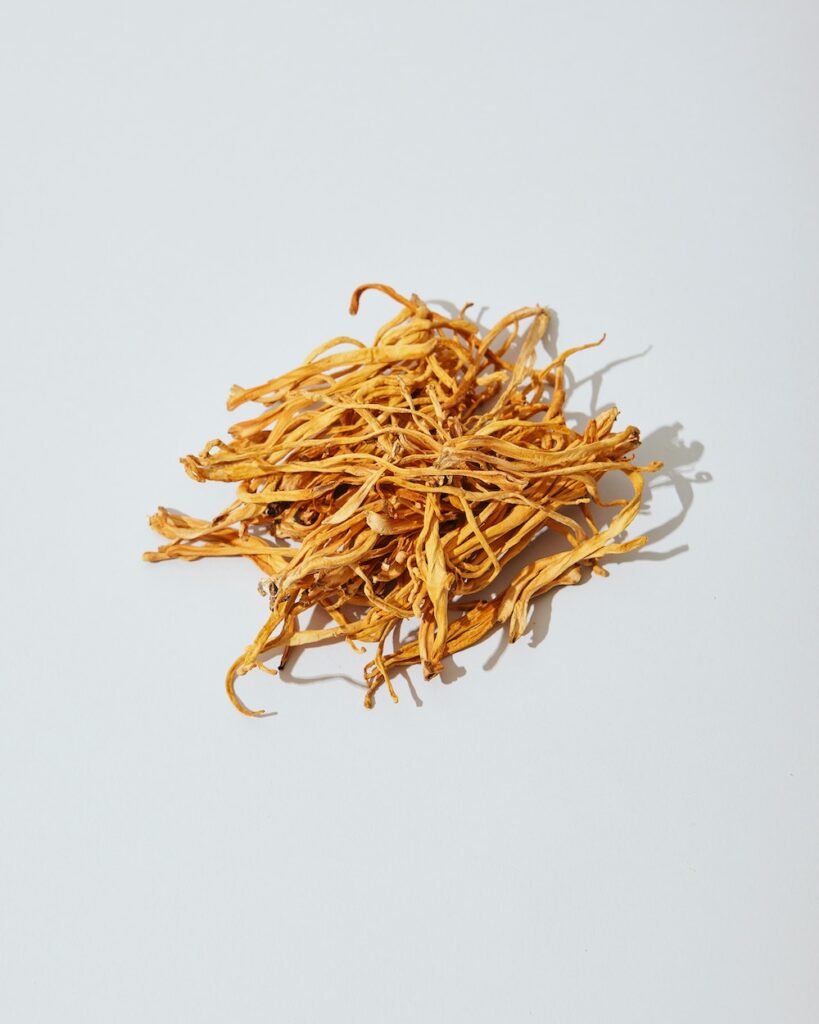Having literally spent the past few years of my life on the road, living out of a backpack, I’ve faced a fair share of travel ailments: horrible tummy troubles, skin fungus, all kinds of bug bites, bus and boat sickness, and cuts, scrapes and bruises. The irregular nature of travel, the constant changes of daily routine and surroundings, the unexpected bumps on the road, and the food indulgences that can really throw off your digestion—and so much more.
I’ve never liked taking medication and prefer to heal myself in natural ways. Now that I have the wisdom of Ayurveda to guide me to self-healing, travel has become much less painful and healing time is way quicker. Doesn’t matter if you’re a wild traveler like me or keep everything organized. Sometimes you just can’t prepare for what is coming but nature offers everything we need for general first aid. I collected my favorite Ayurvedic herbs, oils, and supplements I always keep in my bag when journeying and also grouped them with tips and tricks for each dosha to help with their traveling style, as they are all so different.

Ayurvedic First Aid Kit for Travelers
For Pitta Travelers
If you are Pitta dosha as me, you probably loose your temper easily when your travel meets some unexpected surprises such as a delayed flight, long airport security lines, or getting stuck in a traffic jam.
Pitta (fire and water element) is responsible for your digestion and transformation in the body and mind. Its main site being the small intestine. When Pitta is in balance, it provides strong digestion, great organizational skills, and strong stamina. Out of balance, pitta is prone to indigestion, excessive sweating, stubbornness and impatience (Hello long queues at the airport check in desk.)
As a Pitta, I tend to go to extremes, so after making a list of all the sights I want to see, take a few items off the list and take more time out to rest. Spending time in the cool mountains, near or in water, or any cooling environment pacifies Pitta, but if you’re vacationing in a city make sure to visit a park with a pond.
Balancing your internal body temperature can help to cool heated digestion, so drinking plenty of water (especially in hot summer month), or even better, cool coconut water aids a lot.
Pitta’s have strong digestion, so for us it’s important to not get overly hungry (or to not let yourself get hangry). I love to pack gluten free musli bars in my carry-on bag. At the airport or gas station stores opt for fresh, sweet, juicy fruits like plums, blueberries, apricots, and watermelon. Celery with hummus, and cucumber sandwiches also often make it into my bags.
For Vata Travelers
Long bus or car trips, plane rides propel the body, increasing the elements of air and space (the elements of Vata dosha) in the body and mind. Vata dosha governs all movement in the body. It’s responsible for the movement of the muscles, respiration, and heart, as well as the flow of thoughts and emotions. So naturally, long travel, or irregularity in schedules, can upset these functions, causing stress, feelings of anxiousness, irregular digestion, or constipation.
Vata is balanced by regularity and routine. While it’s hard to keep to a schedule when traveling, try to stick at least to your regular eating routine – eat three nourishing main meals at around the same time as you would normally do at home. Try to have your dinner 3 hours before bed.
Snacks, packaged crackers and chips that you can buy at the airports or gas stations increase the dry quality in the colon, the main site of Vata. To avoid this, travel well prepared. Pack your own healthy snacks like ground oats with nuts, ghee (encourages natural elimination); a sprinkle of cardamom, cinnamon, and nutmeg. You can find hot water in the airport coffee shops or when you make a stop on the road usually everywhere. Always keep a pack of dried fruits or mixed nuts, trail mix, oranges, banana, peanut or almond butter for extra nourishment.
Consume a cup of warm ginger or vata-balancing tea, before or after meals. Cold and carbonated beverages upset the flow of Vata in the body so traveling with a lovely cup of tea can help you to lessen the stress on your digestive system.
For Kapha Travelers
Part of the fun of being on vacation is to treat yourself and indulge, but for Kapha types this can lead to a less fun way of traveling, as too much overindulging can create problems for your digestion. Kapha dosha (made of water and earth) provides the body with lubrication, support, and protection. It creates stability and patience in the mind, which comes handy when traveling.
The main site of kapha is the lungs, with some of the secondary sites being the sinuses, stomach, and joints. Overeating, eating late at night, or eating rich entrées and desserts can stress your dosha, causing nausea, excess phlegm in the nose and throat, or slow and sluggish digestion.
For Kaphas, it’s important to minimize large, late-night meals. Eat your main meal at lunch when your digestive fire is the strongest. If your main meal is heavy and rich, favor appetizers or desserts which are more on the lighter and dry side. Try to eat your evening meal 3-plus hours before bedtime. Avoid eating heavy, sweet desserts during the kapha time of day (6 p.m to 10 p.m.), when your digestive fire is low. Though no need to be wary of exploring spicy foods. Kapha is the one dosha that is energized by spicy food, so don’t be afraid to spice it up when dining out.
Due to kapha’s nature of heavy, oily, and dense, you can tolerate the crunchy, munchy snacks that typically would aggravate vata or pitta. Great snacks are kale chips, raw veggies like cauliflower and broccoli, corn chips, or homemade popcorn.
For all dosha types
While traveling, all doshas benefit from exercise. Increasing your metabolism is a great way to keep balance, so whenever you get the chance do something active. It can be a long walk in the city, swimming, or even going for a run in the morning.
There are some spices, herbs and natural remedies that I like to keep with myself when I’m traveling, or if I can’t bring them with me, I like to get my hands on them from a local store as soon as possible to help me find my balance and grounding.
Turmeric powder
Tumeric is a natural antibiotic and pain-reliever that can be used externally on cuts and scrapes, because it helps to quickly clot blood and disinfect wounds. Tumeric also relieves itching, bruises, and strains. Make a paste of 1 teaspoon organic Manuka honey (or use water if you’re vegan) and 1/4 teaspoon tumeric, and apply to the wound.
Aloe Vera gel
Aloe vera naturally soothes and hydrates. It’s great to have on hand when you’ve been overexposed to the Sun. Applying aloe vera gel externally to rough, dry, itchy, or sunburnt skin makes wonders.
Kutaja Bark powder
When I was in India, I suffered for 3 days from Delhi belly, with horrible diarrhea. I learned from my Ayurveda teacher that kutaja is an Ayurvedic herb that is one of the best for diarrhea and dysentery. It restores colon function, destroys parasites, and promotes well-formed stools. In case of diarrhea, take 1/2 teaspoon kutaja in 1 cup of hot water twice a day.
Triphala powder
Unlike kutaja, triphala shouldn’t be taken when you suffer from diarrhea and dysentery, but it comes handy for sore throats, constipation, and to boost the body’s natural defenses before and during travel. Triphala has natural antibacterial properties, a high Vitamin C content, and supports healthy elimination.
For sore throat, gargle with 1/2 teaspoon triphala mixed in warm water. For constipation, mix 1 teaspoon triphala with 1 cup hot water and drink before bed. To boost your immunity before and during travel, take 1 teaspoon triphala mixed in 1 cup hot water daily.
Tulsi Tea bags
Tulsi, or holy basil, acts primarily on the respiratory system. It alleviates the symptoms of cough, cold and flu, and helps to dispel the kapha dosha from the respiratory passageways. Sip on tulsi tea if you feel a cold or cough coming on.
Tea Tree Oil
Though tea tree oil is not a traditional Ayurvedic medicine, it’s a natural anitfungal, antimicrobial and antiseptic; making it useful for mosquito bites, flea bites, ringworm, nail fungus, cold sores, ingrown hairs, acne, and minor cuts and abrasions. Apply a few drops of tea tree oil to the affected area. But make sure to use Tea tree oil only externally and in very small amounts. Some people may be sensitive or allergic to tea tree oil, so if you never used before, make sure to check yourself for sensitivity.
Probiotics
Ayurveda traditionally recommends takra (Indian buttermilk) as a natural probiotic to replenish intestinal flora. When traveling, probiotic supplements help to strengthen the GI tract’s natural defenses and prevent traveller’s diarrhea. Especially for someone like me, who suffers from Celiac disease and kazein allergy (dairy protein), keeping probiotics with me on the road can be life changing.
Choose probiotic supplements that don’t need to be refrigerated. Look for those with at least 10 billion CFU and multiple strains of probiotics. The strain saccharomyces boulardii is one of the best for preventing diarrhea.
Get more like this—Sign up for our daily inspirational newsletter for exclusive content!
__
Photo: Unsplash




